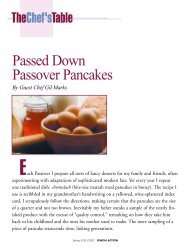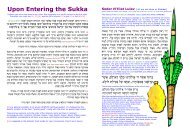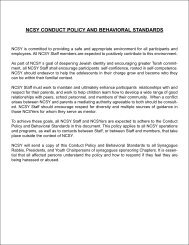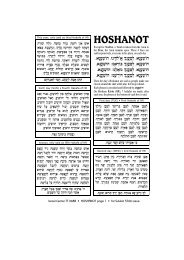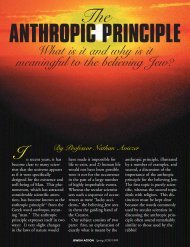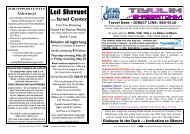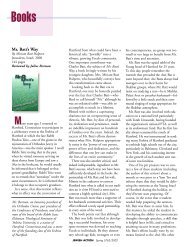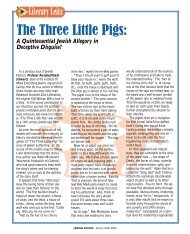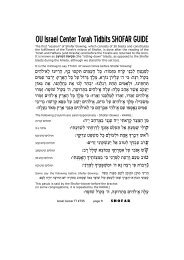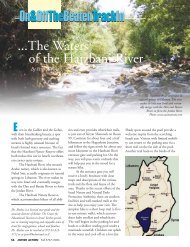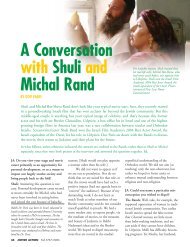You also want an ePaper? Increase the reach of your titles
YUMPU automatically turns print PDFs into web optimized ePapers that Google loves.
Sh'vi'i 7th Aliya 28 p'sukim 24:1425:19<br />
[S>24:14 (2)] We may not take unfair advantage of our<br />
lessfortunate workers. A daylaborer must be paid on time<br />
[588,A200 24:15]. The prohibition of delaying his wages is<br />
counted elsewhere. (Again, a positive & prohib.<br />
[S>24:16 (1)] Close relatives may not testify against (or for)<br />
one another in criminal cases [589,L287 24:16]. There is also<br />
the implication here that a person will not be punished for<br />
deeds of his parents or children. This is an example (one of<br />
many) of a pasuk teaching us two or more quite different<br />
things. In this case, one's a mitzva among Taryag, the other is a<br />
teaching (for lack of a better word).<br />
[S>24:17 (2)] One must not pervert justice even on behalf of an<br />
orphan [590,L280 24:17]. Securities for a loan must not be<br />
taken from a widow [591, L241 24:17]. Our experience in<br />
Egypt is to be remembered as the motive for many of these<br />
"sensitizing" mitzvot.<br />
[S>24:19 (1)] That which is forgotten in the fields after<br />
harvesting must be left for the poor; one should not return for it<br />
himself [592,593;A122,L214 24:19].<br />
[S>24:20 (3)] The previous parsha set down the rules of<br />
SHICH’CHA; this parsha adds rules for proper kind behavior<br />
when picking olives and grapes. Again we are reminded of our<br />
Egyptian experience. Even though Egypt was unspeakably<br />
cruel to us, our experience there is supposed to make us kinder<br />
and more sensitive.<br />
[S>25:1 (4)] The punishment of makot (whipping) is to be<br />
administered by the courts to those found guilty of sins<br />
punishable thusly, but care must be exercised not to exceed the<br />
required number of lashes [594,595; A224, L300 25:2,3].<br />
Do not muzzle an animal when it is working with food<br />
[596,L219 25:4].<br />
[S>25:5 (6)] The widow of a man without children is forbidden<br />
to marry anyone [597,L357 25:5] until... She either "marries"<br />
her brotherinlaw (Yibum) [598,A216 25:5] or the relationship<br />
is severed by chalitza [599,A217 25:9], in which case she may<br />
marry anyone else. (Not a kohen, though, because a woman<br />
who has had CHLITZA is equivalent to a divorcee, whom a<br />
kohen may not marry.)<br />
[S>25:11 (2)] If person "A" is pursuing "B" to kill him, we<br />
must save B's life even if it means killing A [600,A247 25:12].<br />
We cannot show mercy to the pursuer (A) [601,L293 25:12]. If<br />
it is possible to stop "A" without killing him, we must do so to<br />
kill him in this case would be an act of murder.<br />
This is the classic RODEIFNIRDAF situation. It forms the<br />
basis of permitting abortions when the life of the mother is<br />
threatened. Jewish law then considers the unborn fetus<br />
AS IF he is a RODEIF. This is a "stretch" since a real<br />
RODEIF has to intend to kill the one pursued; hence the<br />
term K'ILU, as if. Even though we consider a fetus to be a<br />
living being, it has a lesser status than one born, and this<br />
allows it to be deemed a RODEIF.<br />
[S>25:13 (4)] (Not only may one not use false measures, but)<br />
mere possession of false dry or liquid measures or weights is<br />
forbidden [602,L272 25:13]. Honest weights and measures is<br />
one of the pillars of society; Gd despises those who cheat in<br />
business.<br />
[P>25:17 (3)] The final portion of the sedra is "Zachor". We are<br />
commanded to remember what Amalek did to us on our way<br />
out of Egypt [603,A189 25:17]. The Jewish People as a whole<br />
are commanded to destroy the remnant of Amalek from this<br />
world [604,A188 25:18]. We must never forget what Amalek<br />
did [605,L59 25:19].<br />
Technically, these mitzvot apply to the specific Amalek nation.<br />
The idea, however, must be extended to the Amalektypes that<br />
have plagued us throughout Jewish history.<br />
These final 3 p'sukim of the sedra are reread for the Maftir.<br />
(See also page 16 for the special situation of Zachor this year.)<br />
Haftara 10 p'sukim Yeshayahu 54:110<br />
This is the 5th of the 7 haftarot of consolation. It prophesies an<br />
end to the Exile, a reconciliation between the People of Israel<br />
and Gd. Gd is likened to the husband of His estranged wife,<br />
Israel. The couple will reconcile, so to speak. Gd says that the<br />
Exile is to Israel as the Flood was to No'ach. He promises no<br />
more exile. No more anger. The Exile was temporary. His Love<br />
is everlasting.<br />
The Jerusalem Institute of Jewish Law<br />
Rabbi Emanuel Quint, Dean<br />
Lesson # 249 •Bailments (Part II)<br />
Classes of bailees (Shomrim)<br />
All that is said in these lessons regarding bailees apply whether<br />
the owner and/or the bailee is a man or a woman or a minor.<br />
There is an exception: If the wife holds objects belonging to her<br />
husband and breaks it through her negligence, she is not liable<br />
to him. The reason is for the stability of the home. However, if<br />
she intentionally breaks his things she is liable. If a bailee did<br />
accept an object from a married woman he should return it to<br />
her when the time for the return of the object has arrived.<br />
The following are the four classes of bailees:<br />
(1) The unpaid bailee (Shomer Chinam). In the case of the<br />
unpaid bailee, the owner asks the bailee to guard something for<br />
him. A typical case might be a passenger in an airline waiting<br />
room who wishes to go to the restroom asks someone whom he<br />
knows or whom he just met to guard his suitcase for him. There<br />
are certain expectations that the owner has when he entrusts the<br />
unpaid bailee to guard the suitcase, such as he will not walk<br />
away and leave the suitcase unguarded. The unpaid bailee on<br />
the other hand cannot be expected to safeguard the suitcase if<br />
an armed robber demands that he hand over the suitcase or be<br />
shot. In the situation of the unpaid bailee, the owner is the sole<br />
benefited party and the unpaid bailee receives no benefit.<br />
(2) The paid bailee (Shomer Sachar). The owner, instead of<br />
asking the unpaid bailee to guard the suitcase, can check the<br />
suitcase with a clerk who is an employee of the airport and to<br />
whom the owner pays an agreedupon fee. The owner's<br />
expectations are now higher than they were in class (1) where<br />
the bailee is unpaid. Here the bailee is getting paid and has<br />
greater responsibilities. Both the owner and the paid bailee<br />
receive benefit; the owner in that his object is being guarded,<br />
and the bailee in that he is being paid.<br />
(3) The lessee (Shocheir). A person (the lessee/bailee) wants to<br />
rent a car for a week and he goes to a carrental agency and<br />
rents a car and pays (or will pay) the agreedupon weekly<br />
rental. Both the owner and the lessee receive benefit; the<br />
owner/lessor by receiving a fee and the lessee the use of the<br />
car. The benefits are just the opposite in types (2) and (3). In<br />
Israel Center TT #633 (.pdf version) · page 5 · Shabbat Parshat KI TEITZEI



